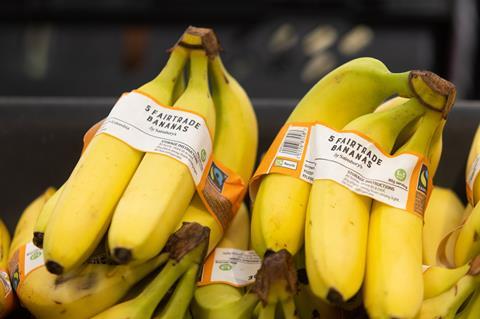As Fairtrade Fortnight begins, the Foundation’s ’Be the Change’ initiative highlights how consumer power can support farmers overseas to build stronger, more resilient communities
A new campaign launched for Fairtrade Fortnight aims to show that UK consumers have the power to help protect the future of everyday essentials including bananas, cocoa and coffee through the cumulative impact of purchasing decisions.

With the campaign titled ‘Be the Change’, Fairtrade Fortnight will celebrate the impact created by millions of people across the UK for farmers and agricultural workers overseas by choosing Fairtrade products.
Two new YouGov research studies commissioned by the Fairtrade Foundation have said Britain’s most popular Fairtrade buy was bananas.
Around seven in ten UK adults said they bought a Fairtrade product during the last year, the Foundation explained.
The Foundation explained that, throughout Fairtrade Fortnight, billboards strategically placed outside supermarkets in Birmingham, Bristol, Cardiff, Edinburgh, London and Manchester to catch shoppers’ eyes would riff off the research to highlight regional trends and congratulate shoppers for supporting farmers worldwide.
Supermarkets and leading brands are putting on a range of offers in stores, including the Co-op offering 10 per cent discount on selected Fairtrade products for their members.
“This Fairtrade Fortnight is extra special as we celebrate 30 years supporting farmers and working for global trade justice,” said Marie Rumsby, the Fairtrade Foundation’s director of advocacy.
”Every Fairtrade purchase makes a difference to farmers’ lives, and we want to remind shoppers that when they next visit a supermarket, they choose products with the Fairtrade logo, as these ensure farmers receive fairer prices for their hard work and can invest in their families and communities.
“Fairtrade’s minimum price, premium payments and standards – and the fair prices they guarantee – mean farmers who produce our much-loved products like coffee, tea, bananas and chocolate can afford to put food on the table, send their children to school, cover their farm costs, and adapt to the changing climate,” she continued.
“Without the stability a fairer trade system provides – and as farmers tell us climate change is making it harder to grow crops – it is more important now than ever to show solidarity so future generations of farmers will be able to continue farming.
”But choosing to buy Fairtrade products helps build their resilience to these global challenges and helps keep our favourite products on our supermarket shelves,” Rumsby added.
The research revealed that significant sections of the British public continued to back fair prices and fairer terms of trade for overseas farmers.
Some 85 per cent of UK adults thought farmers in low-income countries should receive stable and fair pay for the products they grow.
Meanwhile, people were buying Fairtrade for the right reasons, with over half (54 per cent) of UK adults understanding that buying Fairtrade had a positive impact on the lives of farmers and workers.
In addition, four in every five adults in the UK (79 per cent) were concerned about the potential effect of climate change on the price of food in the UK, with 69 per cent concerned about the potential effect of climate change on the supply of food in the UK.
“Sometimes, we feel like we can’t keep going, that we’ll have to give up,” one Colombian Fairtrade banana farmer, Maria Doris Calvo Ortiz, recently told Fairtrade.
”But then we remember the support we get from people choosing Fairtrade. It’s what keeps us going and allows us to take care of our families and our community, one banana at a time.”
In addition to urging shoppers to ‘Be the Change’ to help reach more farmers who face the challenges posed by an unfair trade system and the impacts of climate change, Fairtrade has also called on businesses and politicians to play their part.
The UK public support this call, with 60 per cent of UK adults saying politicians should be doing more to ensure farmers and other agricultural workers in low-income countries are paid fairly.
“Buying Fairtrade is essential, but shoppers can’t ‘Be the Change’ on their own: we need the support of businesses and government to transform our global trade system so that it supports the millions of farmers and workers who produce our food,” said Rumsby.
This fortnight, we are calling on the UK public to join us in asking their newly elected MPs to pledge to ‘Be the Change’ to make trade fair, and for the new government to develop a trade policy that genuinely works for people and planet.”



